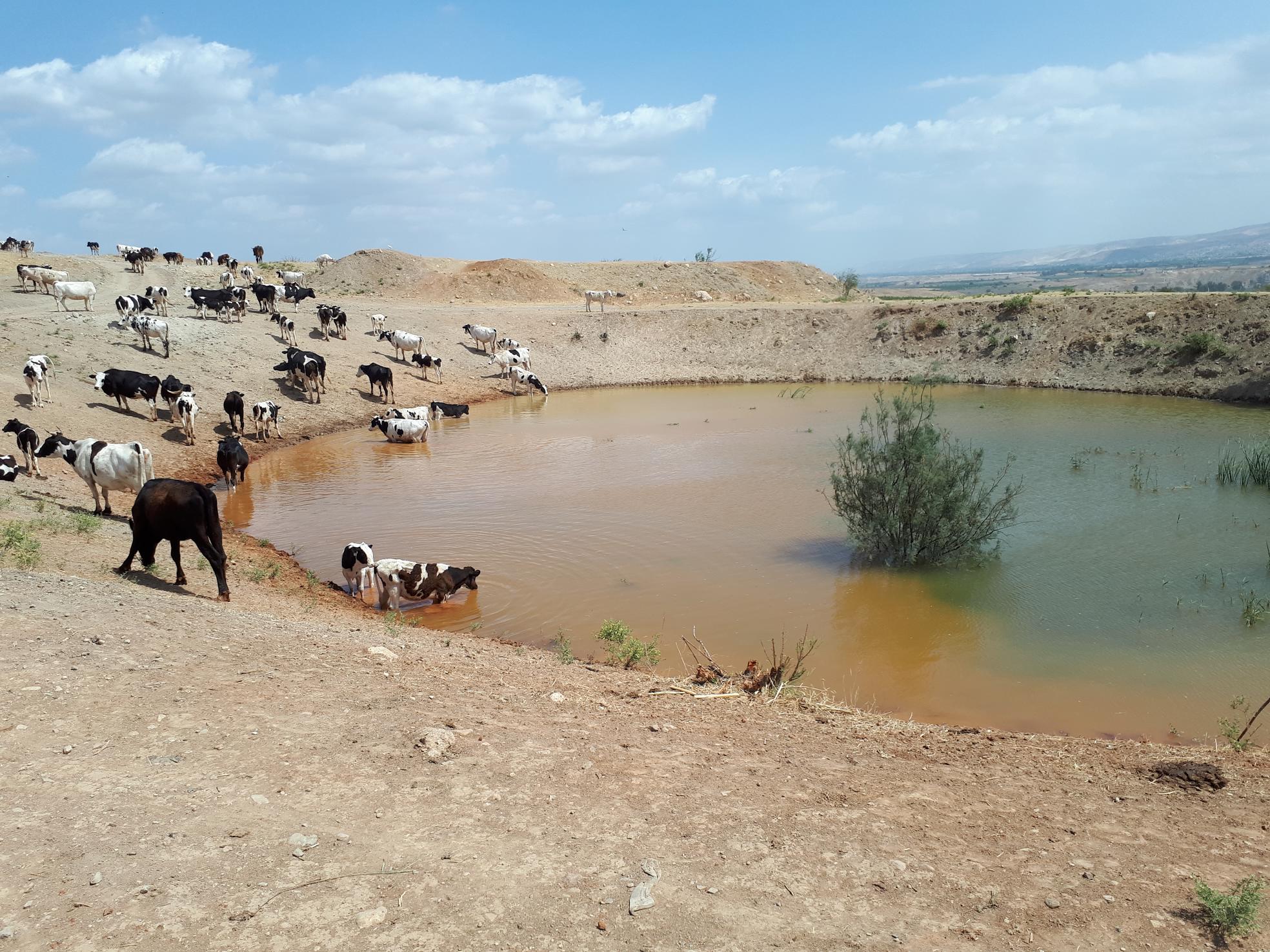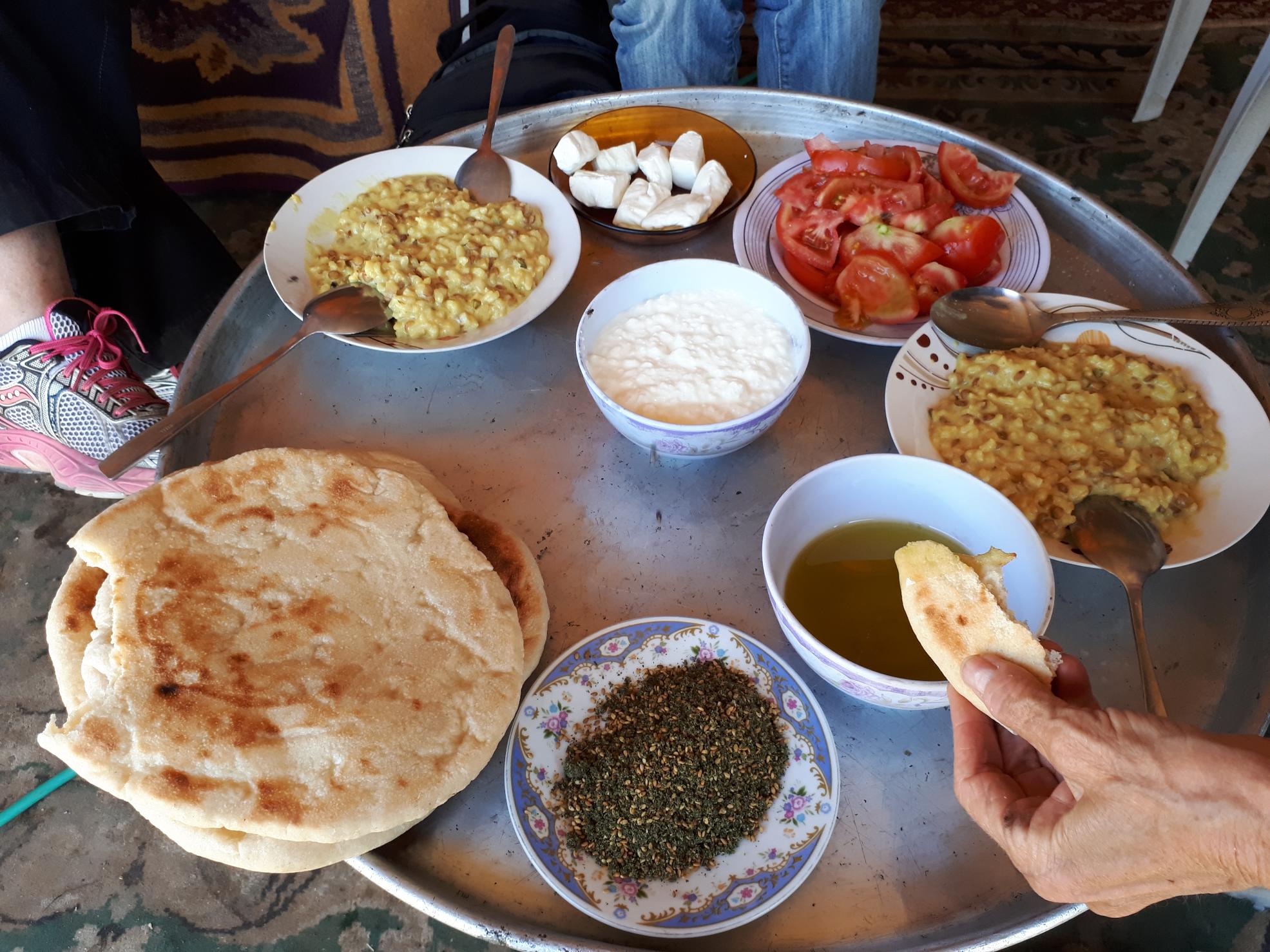The Palestinian Jordan Valley: Who steals from whom - water, land, freedom and livelihood?

8:40 The Tapuach-Zaatara Junction Checkpoint is unmanned. The soldiers, as usual, stand at the hitchhikers’ posts around the checkpoint, stopping Palestinian cars. It is in fact for all purposes a multiple checkpoint, but misleading, and therefore unnoticed.
9:00 – Gitit Checkpoint (Maale Efrayim) – unmanned. The soldiers are in the nearby watchtower.
Hamra Checkpoint – unmanned, on our way back in the afternoon – 17:30 – as well.
En A-Sakut – The Palestinians whose lands were confiscated in 1967 to create a demilitarized zone (returned to them by an Israel Supreme Court ruling a year ago) still cannot cultivate their land. In the autumn the Jewish settler colonists sowed these fields and the Palestinians had to wait for harvest time. But now the Palestinians graze their cattle there every day. Until a week ago, the settler-colonists of the illegal outpost were settled on the Palestinians’ land and denied them access to a beauty spot inside their area – a fresh water spring divided in three: the smaller part whose pure water is good for human consumption, the middle one is good for swimming, a kind of reserve for both Jews and Palestinians (but the Palestinians do not dare approach it), and the large part is for watering the cattle, sheep and goats. In an area where water has become so rare, such a spring is a gold mine.
We informed the shepherds we were coming and they sat on the hill above the spring and waited for us before they would let the cattle go down to the water. What joy! While we were there, three settler-colonists from Mekhola came with their pick-up trucks, right through the Palestinians’ herd, and one of them. Gil’ad, drove so fast he jeopardized the cows’ lives. The shepherds tell us that these settler-colonists always show up when the Palestinians bring their flock to the spring. According to them, if we (Machsomwatch) are not there they chase them off and call the army to come help them remove the landowners from their own land!
Bardala –we visited the fields there again, where the water pipes have been cruelly cut – the corn is drying out, the cucumbers are gone and the trees are slowly dying. We went to see the Palestinian water pump paralyzed because Mekorot (Israeli water company) built giant pumps next to it, reaching deeper than 300 meters in the ground, while the Palestinians are not allowed to pump below 70 meters.
We met with local councilmen who told us the history of the water problem:
In 1972 Mekorot allotted Bardala villagers (numbering about 300 in 1967) 240 cub.m. an hour for agriculture, and the rest of the water – 3000 cub.m. an hour, went to the only Jewish settler colony in the area – Masua. In the meantime dozens of new colonies have been built, taking over thousands of dunams of fertile land, and planted date palms, grape vineyards and other crops. They now use thousands more cub.m. of water. Mekorot began to reduce the water allotted Bardala until in the past ten years their ration has gone below 100 cub.m. (about 23 cub.m. an hour, according to them)!
Yes, it is likely that the desperate Bardala villagers connected themselves to a Mekorot main and “stole” water. They turned time and again to Mekorot and to the Civil Administration , in vain. In the meantime, for a long time, the settler colonies are swimming in thousands of cub.m. that used to belong to the Palestinians, for whom lss than 100 cub.m. are left. Uproar from the thieving settler-colonies – “they’re stealing our water!!
, in vain. In the meantime, for a long time, the settler colonies are swimming in thousands of cub.m. that used to belong to the Palestinians, for whom lss than 100 cub.m. are left. Uproar from the thieving settler-colonies – “they’re stealing our water!!
Who stole land and livelihood from whom? Who cut the Palestinians’ water pipes? Who stole freedom and dignity from whom, and who now employs Palestinians under slave conditions in the lush and generous fields at the expense of Bardala’s water?
A visit in Samara, below the Umm Zuka nature reserve and Peles army base. In the past, Palestinians would graze their sheep in the reserve and its surroundings (and were steeply fined when caught inside that measly reserve). Since the illegal outpost was built over their heads, and after several violent outbursts by the settler-colonists against the Palestinian shepherds, including theft of donkeys, the shepherds graze close to home as long as there’s still some dry grass. What will do in the summer, when the flock has nothing more left to feed on? What will they do?

